- Home
- Andrew McGahan
Treasures of the Deep Page 17
Treasures of the Deep Read online
Page 17
North crept the Revenge, bearing always the dead weight of its captor, and closer crept the reefs. And lo, the wind and currents held true … nevertheless, with the shallows still some fifty miles away by the navigators’ charts, the ship, to the dismay of all, began to veer eastwards. Slowly only, and by points only on the compass, but against the current, and in resistance to all the crew’s efforts to pull the ship north again, either by sail or by sea anchor.
There could be no doubt of it; beneath them, the Fish was exerting itself, and manoeuvring to avoid the shoals ahead. It had not been known until then that a Rope Fish was even capable of this; most opinion held that the monstrous things could only drift with tides and winds, along with their prey. But no, somehow, down in the deeps, the unknown shape knew of the peril ahead, and by dint of some mighty fins maybe, or perhaps by use of internal pulsing, as a giant squid might, was swimming to the east.
In later years, indeed, it would become obvious to Roland that the Rope Fish not only could swim and navigate in its own fashion, but that it was also, from its long wanderings, familiar with every mile of the ocean floor. For never once in all those years would the Revenge ever again come within sight of a shore or an isle or even a reef. The Fish avoided all such shallows, and held to its beloved deeps. But it should have been obvious perhaps even in those early days, for after all, who had ever heard of a Rope Fish washing ashore the way a helpless jellyfish might? It had never happened.
But desperation will often blind reason, and so the crew fought on for another two days after the eastward trend was noted. Their efforts were ever more febrile and frantic, however, and at last the navigators called an end to it – the reefs stood directly west of them by then, and out of all reach, and ahead lay only the vast inner wastes of the Middle Sea.
It was now that a truer despair came to the ship. This was not the panic and terror of the initial capture, this was a deeper, more debilitating sense of defeat, of knowing that they had tried everything within their power to escape, and failed. This was the hopelessness that is left when even the fantasies of escape are gone, and there remains only the wait for death.
There were some indeed who saw no point even in the waiting; it was now that the first suicides took place. They were not many – for even in despair, life is not easily surrendered – but quietly, in corners here and there about the ship, men armed themselves with pistols, or bayonets, or nooses formed from rope, and made the only escape that was left to them. And once begun, the trickle of suicides never ceased. In the months that followed, there was always the chance, when moving about the decks, of happening upon a body slumped amid a bloody pool, or dangling ghastly from an overhead beam.
And even though the majority of the crew forswore such ends, and carried on with the necessities of life, a deadly lassitude now sank over the ship. It wasn’t an instant decline, or complete within a day or two, it was rather a gradual dwindling, a surrender of purpose that took place over several weeks, the Revenge drifting northeast all the while. But after a month, the lethargy was fixed. By then, many of the crew barely stirred from their hammocks even by day, seeking solace from their plight in sleep and dreams instead. Others roamed the ship restlessly, hollow-eyed, withdrawing into mania and madness. True, there were a few who still clung to hope of rescue, climbing high in the rigging at every dawn to watch for a sail on the horizon, in the stubborn belief that a friendly ship might come to their aid. But most understood that this would never happen. Any ship that came near, and saw the white ropes, would flee forthwith. But the watchers watched for them anyway.
Roland was one of those who took mostly to bed. Never an optimist – at least, not since the war had begun and ruined his life – he saw no prospect in rescue or escape. Indeed, his sympathies lay with those who had taken their own lives, and so ended the farce. He toyed with the idea himself, but the fact was, it plain terrified him – for what if he was wrong? What if, the day after he committed the irrevocable act, the Fish magically grew bored with the Revenge and let the ship go? Or what if rescue, however unlikely and unimaginable, did come, just a day too late for Roland to see it? No … he couldn’t kill himself. He couldn’t even grasp how others had done it. How had they been so sure, so certain, that there was no chance of a mistake?
From such fears, he chose life. In the meanwhile, however, he saw little point in exerting himself, and thus remained much of the time in his cabin, sleeping in long, stupefied bouts, increasingly neglectful of his responsibility for Pietru. What did he care anymore what happened to the scapegoat? He had never cared anyway, he had only performed as watchdog because the captain had ordered him to do it. And these days the captain’s orders did not carry the weight they once had: indeed, since the failure to steer the Revenge upon the reef, the captain himself had rarely appeared on the high deck, and discipline about the ship was, like everything else, deteriorating.
Roland did still sit with Pietru at the evening meal in the Great Cabin, and helped him eat, for otherwise the scapegoat made a mess of the table and the other officers would complain. But beyond that, Pietru was left to make his rounds of the ship alone. And he did not like it. Every time he completed a lap of the vessel, he would pass by Roland’s door and knock heavily. ‘Rowand,’ would come the plaintive demand, ‘Rowand. Come out!’
In reply, Roland only ever buried his head in his pillow and cursed in silence, and waited for the knocking to stop. Why wouldn’t the great simpleton leave him alone? Didn’t he understand that they were all going to die? What was the point of endlessly patrolling the ship anymore?
And it seemed that Roland was not alone in such thoughts. He overheard two officers in the Great Cabin discussing the fact that the crew were increasingly short-tempered with Pietru’s interference and interruptions. It was to be expected, perhaps: Pietru’s only role on board was to protect the ship against ill-fortune, and he had patently failed to do that. So why should the crew tolerate his clumsy intrusions any longer?
‘You, Rowand,’ said one of the officers, suddenly noting that Roland was nearby. ‘You better watch out for him. Things could turn ugly, and the captain won’t take kindly to a murdered scapegoat.’
But the next morning, when the knocking came wheedling at his door – ‘Rowand, Rowand. Come out, Rowand.’ – Roland only squeezed his eyes shut and ignored it till it went away. Then he slept, and did not notice that the knocking did not return within the hour, as it should have, or the hour after that. And when knocking finally did come again, it wasn’t Pietru and his hapless pleading, it was the furious hammering of the ship’s first officer, summoning Roland immediately to sick bay, by captain’s order.
Confused and trembling, Roland went, and found the captain waiting by one of the beds, wherein lay a figure weeping in pain and wrapped in bloody bandages. It was Pietru, and he had been badly beaten.
‘He was found in the hold,’ the captain explained, pale and tight-lipped with anger. ‘No one knows how long he was lying there, or who did this to him. The question is, where in all damnation were you?’
There was nothing Roland could say, he could only stare aghast: both of Pietru’s eyes were blackened, his nose was bloody, his scalp – to judge by the bandaging – was lacerated, and livid bruises were already showing on his fleshy arms. He must have been punched and kicked for a prolonged period. Someone, somewhere below, had finally lost their patience … and Pietru had been all alone, with no one to defend him. And Roland sensed that it was the loneliness – even more than the pain or humiliation – that made Pietru weep now, in great hitching sobs that were childlike and terrible.
‘From this moment on,’ said the captain icily, ‘you will spend your every moment, waking or not, with our scapegoat. And if one more scrap of harm comes to him, I will lock you in the brig and leave you there even as the rest of us die off one by one. Do you understand?’
Roland nodded numbly.
‘And find out who did this!’ snapped the captain to the first officer,
before storming off. ‘They must be flogged!’
But they never did find out who had done it. The crew closed ranks on the matter. As for the captain, he remained in charge only a few weeks longer anyway. After all, what was the use of discipline or order on board the Revenge anymore? Mutiny was inevitable, once hope was gone.
It began over the wine ration. The daily issue had in fact been raised somewhat since their capture, to boost morale, but there were many among the crew who now questioned why it should be rationed at all. Why shouldn’t they be allowed to drink to their heart’s content every night? If all were doomed regardless, then what was the wine being saved for? The same question applied to food: why bother to stretch out their supply? Let everyone drink and feast while they may, since death was coming no matter what.
Wine barrels were stolen, and found smashed and empty in the lower holds. In response the captain cut the wine ration entirely and placed armed guards on the storerooms. Unwisely. That same night the crew rose up and overthrew not only the guards and the storerooms, but rampaged through the stern castle as well, ejecting all junior officers from their cabins, and killing outright the captain and the senior officers. The mutineers then took up home in the cabins of their former commanders, declared themselves in charge, and announced that all rationing was lifted forthwith.
There followed a week of non-stop debauch as the food and wine stores were plundered without let. The Revenge became a floating bedlam of drunkenness and gluttony, with almost everyone taking part, even the erstwhile junior officers. Only a few sober souls forswore the revelry, hiding out in the lower levels while the upper decks were awash, listening in fear and wonder to the shouts and laughter and singing from above, and also the gunshots and screams and sounds of breaking timber and glass.
Roland was one of the latter, not from any particular sense of propriety, but because he knew how unpopular he was with the crew, who might, in their drunkenness, assault or even kill him, as they had the captain. He felt unsafe enough even as it was, skulking on the lower decks. Yes, he did have his officer’s pistol with him still, which would be some defence, but not much in truth, for he had powder enough only for a single shot.
To make things worse, Pietru hid with him. The scapegoat had recovered enough from his beating to be able to walk again, but rather than blame Roland for that beating, he now refused to be out of Roland’s presence at all. As if it wasn’t already infuriating to be reduced to this scavenging existence below decks, without Pietru shambling behind all the while! But Roland could think of no way to be rid of him. No insult, no abuse could pierce the simpleton’s thick skull. There was nothing to be done but endure.
After a full week of orgiastic indulgence, a prolonged silence finally settled topside: the party was over. Now Roland and Pietru and the other abstemious hiders could emerge at last to survey the damage. And damage there was in plenty. The ship might have been through a hurricane, so bestrewn was it with filth and tangled lines and broken timbers – and corpses. Quite apart from those snoring off their excess in various corners, there were several dozen sleepers who would never wake again, some obviously murdered, some who had – in the fullness of inebriation – taken their own lives.
The wine hold, meanwhile, had been emptied, and a vast quantity of the ship’s food stores had been consumed, especially the meats and preserved fruit and other luxuries, much of it left to rot uneaten by the engorged feasters. Now only basic provisions, biscuit and grains, remained; a few months’ worth maybe if doled out with proper care – and there was little chance of that. The mutineers were surly and hung-over and regretful, perhaps, but that hardly meant they were prepared to return to disciplined ways.
Indeed, the Revenge never did come to proper order again. It was no longer a military ship at all, in fact, but merely a floating platform on which an increasingly bedraggled collection of survivors lingered in chaos and violence. Once the leading mutineers sobered up, they too saw how grim the food situation had become, and promptly seized most of the contents of the storerooms for themselves, stowing their booty in the stern castle, then barricading the doors. In response, the remainder of the crew mutinied against the mutineers and invaded the fortress, with a new set of ringleaders arising from the victors, who likewise set themselves apart from their fellows, and claimed the supplies as their own. And on it went through the next several weeks, mutiny following mutiny, until the upper decks came to be divided into armed camps, the separate territories of rival gangs who fought each other endlessly over the ever-dwindling provisions.
Roland and Pietru, friendless and shunned by all such gangs alike, took permanently now to the no-man’s land of the lower decks, where they lived in pitiful squalor. To drink, they relied on collecting the water that dribbled down from the higher decks during rainstorms. As for food, the fact that they had any at all was due to the single piece of good fortune that Roland had experienced since the war began. In a corner of a plundered storeroom, hidden away behind a pile of filthy bedding – perhaps even secreted there by some foresighted seaman who had since been killed – he found a treasure beyond price: two small crates of dried biscuit. Doled out painfully at the rate of two or three portions a day, it was enough – just enough – to sustain life.
It would have lasted twice as long, of course, for one person, rather than two. And in a dark part of his heart, Roland might have well been prepared to let Pietru starve, for in their mutual isolation the scapegoat had become more grating than ever: his noises, his smell, his unpredictable behaviour. Surely it wasn’t Roland’s duty to surrender his own chances of survival for the sake of one who was scarcely aware of being alive at all?
But it wasn’t that simple. Roland could never manage to sneak away from Pietru to eat in private, so closely did the scapegoat dog his footsteps, and yet if he tried to eat without feeding Pietru as well, then the scapegoat would begin to hoot and laugh loudly, too noisy altogether – for someone might come to investigate, and that could not be allowed. The biscuit must be kept secret. Roland had moved the crates to the most secluded corner he could find … but the upper deck gangs still sent armed foraging parties down through the lower decks from time to time, hunting out the last of the ship’s rats for fresh meat, and Roland lived in terror of his treasure being found out.
So to silence Pietru he was forced to give the scapegoat his own biscuit to eat. Still, for every portion Pietru ate, Roland ate two. It seemed only fair. Roland was the one who had found the crates, after all. And the scapegoat never complained, he merely munched happily on whatever he was given, not seeming to expect more. Indeed, despite these desperately short rations, Pietru, as the weeks went by, appeared to lose little of his great bulk, while Roland himself became more and more gaunt. It was baffling.
And all the while, as the Revenge devoured itself in ever-increasing wretchedness, the Rope Fish clung on, hidden below in the deeps, and seemingly imperturbable. If it was aware of the agonies and depravities of those it had imprisoned – indeed, if it was even capable of such awareness – it gave no sign. The only noticeable change in the monster, in the months since the ship’s capture, was that whereas its white ropes had been sticky and clinging as they had risen from the water – lethally so, for those men caught up in them – now they were smooth and hardened, like shiny leather.
But few of the crew took notice of the ropes anymore; their enfolding presence had become as commonplace as the sea and the sky, and as immutable. The battles for food were all that mattered. In this respect, however, Roland was different: for once every day his attention was drawn by force to the creature that held them. Pietru was the cause of this. The scapegoat had developed a bizarre form of … communion … with the Fish.
Exactly how it had started, Roland could not remember, other than that a few weeks after the capture, he began to notice the scapegoat stroking or prodding at the white ropes. Not in any effort to break them, but seemingly out of curiosity. The sensation of the white strands against his fing
ers appeared to fascinate Pietru in some way, for his expression would go thoughtful and distant, and then he would smile as if in great happiness.
This was on the main deck, in the days when Roland and Pietru were still free to roam the ship. Once they were confined to the lower decks, however, the only way the scapegoat could access the Fish was through the gunports, each of which opened now to a translucent square of white strands, a section of the great caul woven about the ship. Pietru would push and poke at this wall – which gave elastically – until his hand was fully enveloped in it, chuckling to himself all the while, as Roland watched on in vague disgust.
For it was disgusting, to fuse with the Fish in such a way. What in the deeps did the scapegoat gain from such an experience? Once or twice, Pietru even glanced up to Roland and then nodded benignly to the other gunports, all equally sheathed in white, as if to suggest that Roland follow his example. But that was insupportable. The Rope Fish was their enemy, their jailor and tormentor. Roland wasn’t going to fondle it.
And yet his thoughts would run on uneasily as he watched Pietru, an intuition stirring in his heart as the white tendrils gripped around the scapegoat’s hand. What was the creature, truly? What motives drove it? What was its purpose for holding them? Why had it taken them exactly when it did? Yes, Roland had heard all the theories by now – that these monsters sought only for buoyancy in their attacks, and imprisoned ships entirely by unlucky chance. But if it was a rare thing for a ship wandering idly upon the sea to be taken, then what was to be made of the Revenge, which was taken in mid battle, just as they were about to claim prisoners of their own?
The odds of that were astronomically high to Roland’s mathematical mind. Too high, indeed, to credit. It was almost as if the Fish had been acting outside of random chance, and instead was motivated by a specific purpose. And sometimes Roland would remember, chillingly, the scapegoat’s sobbing moan on the day he had killed the bird. Bad, bad – bad luckcoming now. Was that it, then? Had Roland brought this upon them all?

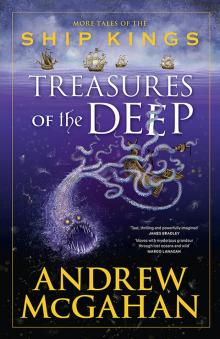 Treasures of the Deep
Treasures of the Deep The Rich Man’s House
The Rich Man’s House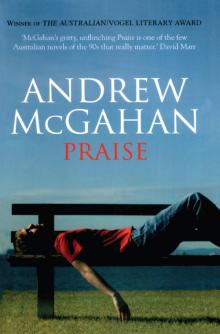 Praise
Praise The White Earth
The White Earth 1988
1988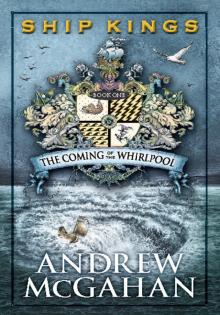 The Coming of the Whirlpool
The Coming of the Whirlpool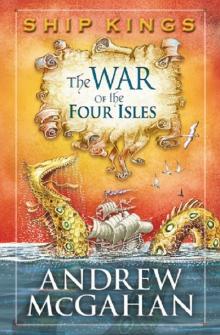 The War of the Four Isles
The War of the Four Isles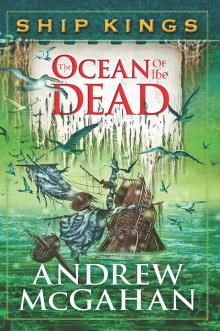 The Ocean of the Dead: Ship Kings 4
The Ocean of the Dead: Ship Kings 4 Last Drinks
Last Drinks Wonders of a Godless World
Wonders of a Godless World Underground
Underground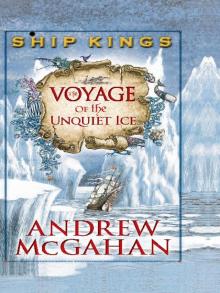 The Voyage of the Unquiet Ice
The Voyage of the Unquiet Ice